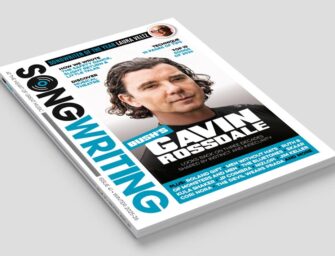
néomí: “Art doesn’t come from control; it comes from letting go.” Photo: Liz van den Akker
The Surinamese / Dutch folk-pop songwriter on letting go, self-observation, clarity, and embracing the merits of critics and haters alike
néomí grew out of the musical landscape of Zwijndrecht to become one of the Netherlands’ most distinctive young songwriters, building a cross-European following through a run of carefully crafted releases. Her early EPs and Edison-winning debut album, Somebody’s Daughter, traced a path from sparse folk foundations toward a broader, full-band palette, carrying themes of self-reflection, repair, and the steady reckoning that comes with learning to see yourself differently.
Her new EP Another Year Will Pass – featuring Do You Want To Be Honest?, Sit Back Baby, It’s Never Easy (Leaving Someone Behind) and more – continues that trajectory. It offers a portrait of an artist refining her craft while allowing more openness into the frame, a shift that underpins the set of lessons she has come to rely on…
1. DON’T TAKE YOURSELF TOO SERIOUSLY
The best songs and ideas often come from play, from curiosity, from being unafraid to look stupid. When you treat your art, or yourself, too seriously, you cut off that spontaneous energy that makes creation fun in the first place. Life isn’t a performance we’re being graded on; it’s a temporary experience we get to explore. ‘Fucking around’ is how you discover your sound, your truth, your quirks. Don’t worry about being profound or perfect; worry about being real. The magic happens when you loosen the grip and just see what happens. Art doesn’t come from control; it comes from letting go. We’re here to live, do stuff, and leave again. So have fun doing the stuff.

néomí: “Learning to observe emotions rather than become them changes everything.” Photo: Liz van den Akker
2. YOU ARE NOT YOUR EMOTIONS
As artists, we often confuse our emotional state with our identity. When we’re sad, we are sadness; when we’re angry, we are anger. But emotions are visitors; they pass through, they don’t define who we are. Learning to observe emotions rather than become them changes everything. It lets you write from awareness instead of reaction. If you can name what you’re feeling without judging it, you can turn it into something beautiful. A song that comes from a feeling processed rather than drowned in will always resonate deeper. Remember: your emotions happen because of something, but they don’t tell the full story of you. You are the observer, not the storm.
3. WRITING IS ART, YOUR DIARY, YOUR TRUTH
Rick Rubin said that songwriting is a diary entry, and I couldn’t agree more. Every song is a timestamp of your emotional and creative state. There’s no such thing as a ‘good’ or ‘bad’ song, only honest or dishonest ones. Some people will connect with your work; others won’t. That’s not a measure of quality; it’s a matter of resonance. When someone says one song is ‘better’ than another, what they’re really saying is, “This one speaks to me more.” So, write what speaks to you. That’s all that matters. Every lyric, every melody, is part of your journey, your reflection on being alive. No one can tell you your diary is wrong.

néomí: “If everyone likes you, you’re probably not saying much.” Photo: Liz van den Akker
4. THE MORE HATERS YOU HAVE, THE BETTER YOU’RE DOING
It sounds harsh, but it’s true: if everyone likes you, you’re probably not saying much. The more your work reaches people, the more it will divide them, and that’s a good sign. It means you’re being heard. Art isn’t supposed to please everyone; it’s supposed to provoke, to stir something. So, when you get haters or critics, congratulate yourself. You’ve made someone feel something strong enough to react. That’s impact. Learn the ‘let them’ theory: let people think what they think, do what they do, and feel how they feel. You can’t control their response. All you can control is your expression – keep creating, keep being bold and ‘let them’!
5. BRING CLARITY TO WHAT YOU WRITE
Joni Mitchell once said, “When you’re writing without a moment of clarity, you’re just complaining.” That hit me deeply, because it’s easy to vent through art without understanding what you’re really saying. Writing from confusion can still be powerful, but when you reach clarity, that’s when your song truly lands. It’s the difference between noise and message. Take a step back and ask yourself what you really mean, what truth you’ve uncovered beneath the emotion. Clarity doesn’t mean perfection; it means honesty with purpose. Listeners can feel when you’ve figured something out within the song. That’s what gives it depth. So yes, feel everything, but then find the meaning, and say it clearly.










![Interview: Jessie Jo Dillon [2025]](https://www.songwritingmagazine.co.uk/wp-content/uploads/jessie-jo-dillon-2-by-libby-danforth-335x256.jpg)
























Related Articles